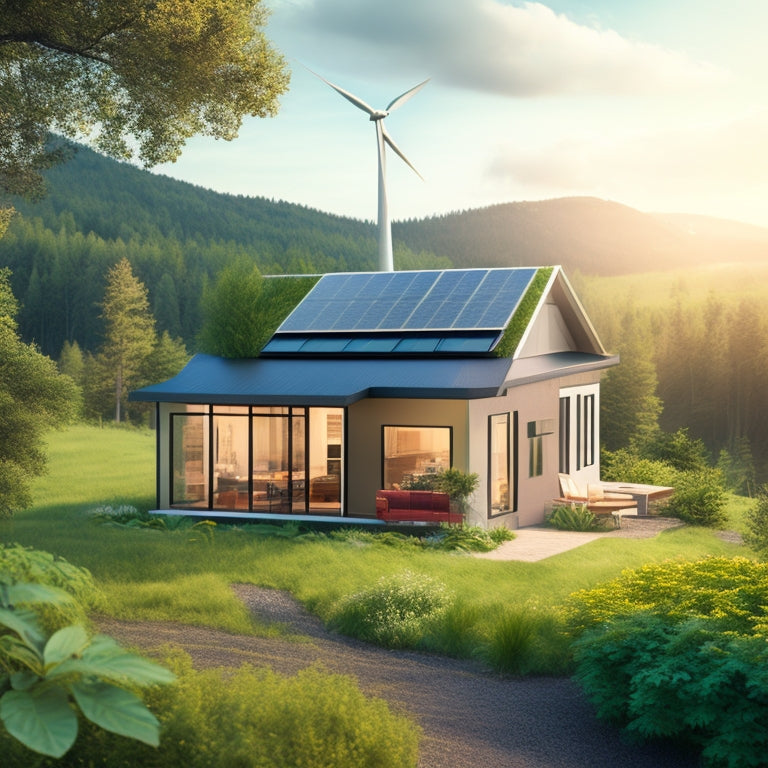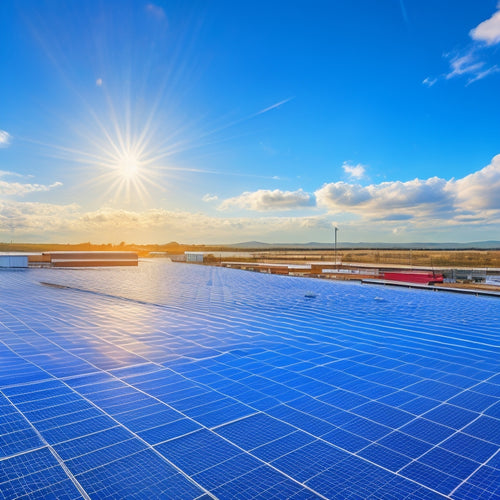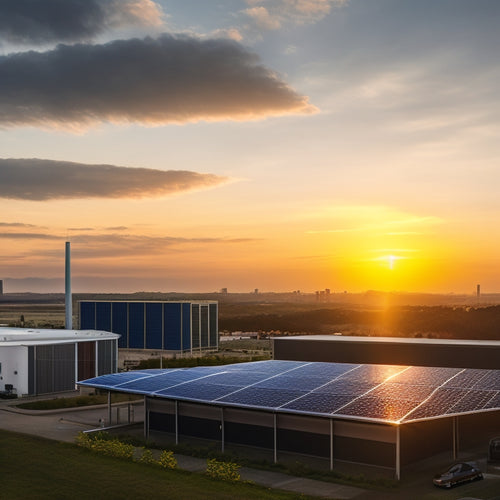
7 Tips for Off-Grid Home Energy Freedom
Share
To achieve off-grid home energy freedom, start by evaluating your energy needs, tracking your current usage, and calculating your daily requirements. Then, design your energy-efficient home with passive elements like large south-facing windows and insulation techniques. Choose high-efficiency solar panels and batteries, considering factors like durability and cost. Plan for energy storage and backup systems, ensuring at least 3-5 days' worth of storage capacity. Monitor your energy usage to identify patterns and optimize resource use. By following these tips, you'll be well on your way to energy independence, and there's still more to learn about optimizing your off-grid energy system.
Key Takeaways
- Assess current energy usage to determine daily energy requirements and identify areas for reduction through lifestyle changes and efficient appliances.
- Incorporate passive design elements, such as large south-facing windows, and energy-efficient appliances to minimize energy consumption.
- Choose high-efficiency solar panels with advanced MPPT technology and pair them with a charge management system for optimal energy storage.
- Size energy storage capacity to handle low production periods and implement energy management strategies to optimize resource use and reduce waste.
- Regularly review energy consumption data to inform decisions on upgrades or replacements and maintain a balance between renewable energy generation and backup capacity.
Assess Your Energy Needs
How much energy will you really need to power your off-grid home? To determine this, you'll need to evaluate your energy consumption.
Start by tracking your current energy usage, including your appliances, lighting, and heating/cooling systems. Reflect on making lifestyle changes to reduce your energy needs, such as switching to energy-efficient appliances or using passive solar heating and cooling.
It's also essential to calculate daily energy requirements by evaluating appliance wattage, usage hours, and total daily consumption.
You'll also need to think about your energy usage patterns, such as how much energy you'll need during peak hours and how you'll handle energy storage.
Accurately evaluating your energy needs will help you determine the size and type of renewable energy system you'll require, ensuring you have a reliable and efficient off-grid home.
Choose the Right Panels
You'll want to select solar panels that meet your energy needs while considering important factors.
Panel efficiency matters, as higher efficiency panels produce more power per hour of sunlight, and you'll need to assess your energy needs to determine the required capacity.
High-efficiency solutions maximize energy harvest, utilizing advanced MPPT technology for best energy capture.
Additionally, solar panel durability is vital, as it directly affects the system's overall lifespan and reliability.
Panel Efficiency Matters
Optimism fuels the pursuit of off-grid living, but it's crucial to ground your expectations in reality.
When it comes to choosing solar panels, you need to evaluate panel efficiency. Solar panel technology has advanced remarkably, but not all panels are created equal. You want to select panels with high efficiency ratings to maximize your energy output. Look for panels with efficiencies above 20%, as they'll generate more power per hour of sunlight.
During panel installation, verify the panels are installed at the ideal angle and orientation to maximize energy production.
Assess Your Energy Needs
Selecting high-efficiency solar panels is only half the battle; you also need to guarantee you're choosing the right panels for your specific energy needs.
To do this, you'll need to evaluate your energy consumption. Start by tracking your daily energy usage, considering factors like lighting, heating, and appliances.
Think about potential lifestyle changes that could impact your energy needs, such as adding electric vehicles or home offices.
Calculate your total energy consumption in watt-hours (Wh) per day. This will help you determine the required solar panel capacity to meet your energy demands.
Solar Panel Durability
When it comes to utilizing renewable energy, solar panels are only as reliable as their durability allows. You need to choose panels that can withstand the elements and last for a long time.
A solar panel's lifespan typically ranges from 25 to 30 years, but some high-quality panels can last up to 40 years. Look for panels with excellent weather resistance, such as those with anodized aluminum frames and tempered glass. These features will help protect your panels from harsh weather conditions, including hail, snow, and extreme temperatures.
Additionally, consider panels with a high IP (Ingress Protection) rating, which measures their ability to resist water and dust ingress. By selecting durable solar panels, you'll guarantee a consistent and reliable energy supply for your off-grid home.
Select Suitable Batteries
As you design your off-grid home energy system, batteries play a vital role in storing excess energy generated by your renewable sources, guaranteeing a stable power supply during periods of low energy production or at night.
When selecting suitable batteries, consider lithium batteries for their advantages, including higher efficiency ratings and longer lifespans compared to lead acid batteries. Additionally, consider the importance of deep cycle capabilities and a high depth of discharge (DOD) High-Capacity Deep Cycle Batteries to optimize your energy storage.
Assure seamless solar integration by pairing your batteries with a charge management system that optimizes energy storage and release. Regular maintenance is essential, so follow tips like monitoring temperature and state of charge to prolong battery lifespan.
Conduct a cost analysis to determine the most cost-effective option for your system. By choosing the right batteries, you'll enjoy reliable energy freedom in your off-grid home.
Design for Energy Efficiency
Your off-grid home's energy efficiency hinges on a well-designed system that minimizes energy waste and optimizes performance. To achieve this, you'll need to incorporate passive design elements, such as large south-facing windows for natural lighting and thermal mass materials to regulate interior temperatures.
Insulation techniques, like double-glazed windows and well-sealed walls, are also essential for reducing heat loss. Conducting energy audits will help identify areas of inefficiency, allowing you to implement targeted improvements.
Additionally, consider ventilation strategies that promote airflow without sacrificing heat or cooling. Finally, prioritize appliance efficiency and water conservation to further reduce your energy footprint.
Consider Energy Storage Options
You'll need to assess energy storage options to guarantee a stable and reliable off-grid energy system.
Battery backup systems are a key component, providing a buffer against power fluctuations and outages.
When selecting a system, you'll want to determine the right energy storage capacity to meet your home's specific energy demands.
Battery Backup Systems
Tapping into the power of battery backup systems can greatly enhance your off-grid home energy setup. When selecting a battery type, consider factors such as depth of discharge, cycle life, and self-discharge rates.
Installation considerations include proper ventilation, temperature control, and securing batteries to prevent movement. Regular maintenance tips include monitoring state of charge, checking electrolyte levels, and performing equalization charges.
System integration involves pairing your batteries with an inverter and charge controller. Be aware of charging cycles, lifespan expectations, and safety protocols to guarantee peak performance.
Inverter options vary, so consider your energy management needs when selecting one. A thorough cost analysis will help you make an informed decision.
Energy Storage Capacity
At least 3-5 days' worth of energy storage capacity is recommended for an off-grid home to secure a reliable supply of power during periods of low energy harvesting. This guarantees you'll have a steady flow of electricity even when your renewable resources, like solar or wind power, aren't generating at capacity.
When considering energy storage options, you'll need to calculate your daily energy usage and factor in variables like seasonal changes in energy demand. Effective energy management is vital to optimizing your energy storage capacity.
Plan for Energy Backup
When designing an off-grid home energy system, planning for energy backup is crucial to guarantee a reliable supply of power during periods of low energy production or system downtime.
You'll want to evaluate generator options that can seamlessly integrate with your renewable resources, such as wind power. Hybrid systems can provide a reliable backup, making sure your off-grid lifestyle remains uninterrupted.
Effective energy management involves identifying potential energy shortfalls and implementing a backup plan to mitigate them. This may include sizing your energy storage capacity to accommodate periods of low energy production.
Monitor Your Energy Usage
How much energy are you using daily, and where's it being consumed? Monitoring your energy usage is essential to achieving off-grid home energy freedom.
By tracking your energy consumption, you'll identify areas of inefficiency and opportunities for improvement. Invest in an energy monitoring system that provides real-time data on your energy usage habits.
This will help you pinpoint which appliances and devices are guzzling the most power. With this information, you can adjust your usage habits, optimize your system's performance, and make informed decisions about energy upgrades or replacements.
Effective energy monitoring is vital to minimizing waste, reducing your carbon footprint, and enjoying the financial benefits of off-grid living.
Frequently Asked Questions
Can I Install Off-Grid Energy Systems Myself or Do I Need a Professional?
You can attempt a DIY installation, but consider your technical proficiency and weigh the risks; safety considerations, like electrical shock and fire hazards, make hiring a professional a recommended choice for a safe and efficient off-grid energy system.
How Do I Handle Snow and Debris on My Solar Panels?
You'll need to prioritize snow removal and panel maintenance to guarantee peak energy production; regularly inspect and clear your solar panels of debris and snow, using a soft-bristled brush or specialized snow rake to avoid damaging the panels.
Are Off-Grid Energy Systems Compatible With Electric Vehicle Charging?
As you weigh off-grid energy systems, you're wondering if they can handle electric vehicle charging - the answer is yes, but it requires careful planning, sufficient off-grid charging capacity, and strategic energy storage to guarantee seamless power supply.
Can I Sell Excess Energy Back to the Grid With Off-Grid Systems?
You can sell excess energy back to the grid with off-grid systems through net metering options, allowing you to offset your energy costs and enjoy energy independence benefits, while still having control over your power generation.
How Often Do I Need to Replace or Maintain My Off-Grid Energy System Components?
You'll need to maintain your off-grid energy system regularly, as component lifespan varies; create a maintenance schedule to guarantee peak performance, replacing components as needed, typically every 5-10 years, depending on usage and manufacturer guidelines.
Related Posts
-

Solar Phone Chargers for Camping Essentials
Solar phone chargers are must-haves for your camping essentials, allowing you to stay connected while enjoying nature...
-

Commercial Solar Energy
As you consider powering your business with commercial solar energy, you'll uncover it offers a triple benefit: signi...
-

Advantages of Commercial Solar Battery On-Site Storage
By investing in a commercial solar battery on-site storage system, you can greatly reduce your energy grid dependence...


